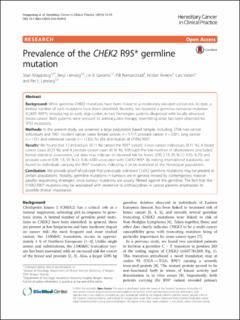| dc.contributor.author | Knappskog, Stian | |
| dc.contributor.author | Leirvaag, Beryl | |
| dc.contributor.author | Gansmo, Liv Beathe | |
| dc.contributor.author | Romundstad, Pål Richard | |
| dc.contributor.author | Hveem, Kristian | |
| dc.contributor.author | Vatten, Lars Johan | |
| dc.contributor.author | Lønning, Per Eystein | |
| dc.date.accessioned | 2020-04-29T12:34:21Z | |
| dc.date.available | 2020-04-29T12:34:21Z | |
| dc.date.created | 2016-10-24T12:34:01Z | |
| dc.date.issued | 2016 | |
| dc.identifier.citation | Hereditary Cancer in Clinical Practice. 2016, 14 (19), . | en_US |
| dc.identifier.issn | 1731-2302 | |
| dc.identifier.uri | https://hdl.handle.net/11250/2652943 | |
| dc.description.abstract | Background
While germline CHEK2 mutations have been linked to a moderately elevated cancer risk, to date, a limited number of such mutations have been identified. Recently, we reported a germline nonsense mutation (C283T; R95*), introducing an early stop-codon, in two Norwegian patients diagnosed with locally advanced breast cancer. Both patients were resistant to anthracycline therapy, resembling what has been observed for TP53 mutations.
Methods
In the present study, we screened a large population based sample, including 3748 non-cancer individuals and 7081 incident cancer cases (breast cancer, n = 1717; prostate cancer n = 2501, lung cancer n = 1331 and colorectal cancer n = 1532), for the distribution of CHEK2 R95*.
Results
We found that 12 individuals (0.11 %) carried the R95* variant: 4 non-cancer individuals (0.11 %), 4 breast cancer cases (0.23 %), and 4 prostate cancer cases (0.16 %). Although the low number of observations precluded formal statistical assessment, our data may indicate an elevated risk for breast (OR: 2.19, 95 % CI: 0.55–8.75) and prostate cancer (OR: 1.5, 95 % CI: 0.36–6.00) associated with CHEK2 R95*. By mining international databanks, we found no individuals carrying the R95* mutation, indicating it to be restricted to the Norwegian population.
Conclusion
We provide proof-of-concept that previously unknown CHEK2 germline mutations may be present in certain populations. Notably, germline mutations in tumours are in general missed by contemporary massive parallel sequencing strategies, since tumour mutations are usually filtered against the germline. The fact that the CHEK2 R95* mutation may be associated with resistance to anthracyclines in cancer patients emphasizes its possible clinical importance. | en_US |
| dc.language.iso | eng | en_US |
| dc.publisher | BioMed Central | en_US |
| dc.rights | Navngivelse 4.0 Internasjonal | * |
| dc.rights.uri | http://creativecommons.org/licenses/by/4.0/deed.no | * |
| dc.title | Prevalence of the CHEK2 R95* germline mutation | en_US |
| dc.type | Peer reviewed | en_US |
| dc.type | Journal article | en_US |
| dc.description.version | publishedVersion | en_US |
| dc.source.pagenumber | 4 | en_US |
| dc.source.volume | 14 | en_US |
| dc.source.journal | Hereditary Cancer in Clinical Practice | en_US |
| dc.source.issue | 19 | en_US |
| dc.identifier.doi | 10.1186/s13053-016-0059-0 | |
| dc.identifier.cristin | 1393999 | |
| dc.description.localcode | Open Access This article is distributed under the terms of the Creative Commons Attribution 4.0 International License (http://creativecommons.org/licenses/by/4.0/), which permits unrestricted use, distribution, and reproduction in any medium, provided you give appropriate credit to the original author(s) and the source, provide a link to the Creative Commons license, and indicate if changes were made. The Creative Commons Public Domain Dedication waiver (http://creativecommons.org/publicdomain/zero/1.0/) applies to the data made available in this article, unless otherwise stated. | en_US |
| cristin.ispublished | true | |
| cristin.fulltext | original | |
| cristin.qualitycode | 1 | |

